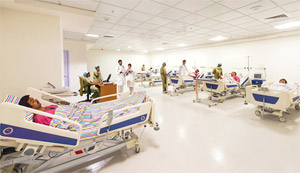Critical and Intensive Care
The Critical Care Unit (CCU) diagnoses and manages life-threatening conditions that require sophisticated organ support and invasive monitoring. Specially-trained staff deliver specialised care for patients with cardiac, surgical, neurosurgical, trauma and other critical medical needs. The unit is the backbone of all medical and surgical treatment.
Multidisciplinary care
Care is provided by a multidisciplinary team to:
- Coordinate the total care of patients with acute, life-threatening illnesses or injuries
- Ensure that treatment is appropriate for all organ systems
- Honour patients preferences regarding medical treatment
- Respect the patients religious and cultural beliefs
 Intensivists are assigned to MIOT’s ICUs on a full- time basis to provide ongoing and consistent care to all patients. The department is equipped to handle any kind of emergency, while expert staff is on hand to offer care, advice and support round the clock.
Intensivists are assigned to MIOT’s ICUs on a full- time basis to provide ongoing and consistent care to all patients. The department is equipped to handle any kind of emergency, while expert staff is on hand to offer care, advice and support round the clock.
MIOT’s highly specialised treatments combine intensive nursing and the latest technology to support the patients’ complex needs as they battle their way to recovery. This includes assisted ventilation with life-support machines, using specialist equipment to take over the functions of the kidney, employing pumps to deliver essential drugs and to support the heart and circulation.
Demarcated, dedicated ICUs

- The Multidisciplinary Medical ICU is a closed Intensive Care Unit with 18 critical beds and 12 step-down beds. It handles patients from various specialties like general medical, pulmonology, nephrology, gastroenterology, neurology and cardiology.
- 12 spacious and exclusive Multidisciplinary Medical ICU rooms for critically ill patients with provision for 1:1 nursing care, Central Monitoring, Continuous Cardiac Output Monitoring, CRRT and ECMO.
- The 7-bed Stroke ICU handles the care of patients who have suffered acute strokes. This is done in close conjunction with the neurologist, neurosurgeon and interventional radiologist.
- For Trauma and Resuscitation, MIOT has a separate 25-bed ICU. The critical care team works alongside the trauma and orthopaedics team, handling poly-trauma and severe head injuries that require active resuscitation, neurosurgical, surgical and orthopaedic interventions.
- MIOT International also has two postoperative ICUs, with 35 beds and 60 beds each. This ICU handles post-op ventilation and stabilisation following gastroenterology and hepatic surgeries, spine and orthopaedic surgeries, plastic, vascular, urological and general surgeries.
State-of-the-art bedside facilities
- The state-of-the-art bedside facilities at MIOT International provide mechanical ventilatory and haemodynamic support to our 15-bed cardiology ICU and the 5-bed bone marrow transplant unit.A recent addition is a new ECMO machine for severe acute respiratory disorder syndrome (ARDS) and heart failure.
- Our sophisticated plasmapheresis machine yields more than 60% plasma volume exchange, a factor of great important for Guillain Barre Syndrome (GBS) and myasthenia.
- State-of-the-art monitors with multi-channel ECG, multi-channel invasive haemodynamic monitoring, continuous temperature and ETCO2 monitoring allow the patient’s care team to keep close tabs on his or her vitals.
- The department also has facilities for in-house ABG, bronchoscopy, ECHO,USG, bedside endoscopy, pacemaker-insertion and IABP for failing heart.
Specialised services
MIOT’s Critical Care Unit has valuable experience in caring for shock and septis patients.
Patients who are in renal failure are treated with various modes of renal replacement therapy, such as haemodialysis, sustained low-efficiency dialysis for patients with unstable blood pressures, and acute peritoneal dialysis. The unit also has CRRT for patients with severe haemodynamic instability and renal failure.
The Active Bariatric Surgery Unit deals with morbid obese and sleep apnea patients with respiratory failure.
Stroke-management
At MIOT International, acute strokes are routinely handled and the unit has the facilities for emergency clot lysis and neuro-radiological intervention. The department treats patients who have had catastrophic strokes and require decompressive craniectomy and clot evacuation. This group of patients need close neuro-monitoring and rehabilitation. Subarachnoid haemorrhage, requiring coiling and HHH therapy, cortical venous thrombosis, status epilepticus etc. are also treated by the department’s specialists.
Care of post-cardiac arrest patients, who require invasive haemodynamic monitoring and, sometimes, therapeutic hypothermia, also fall under the purview of the Critical Care Unit.



